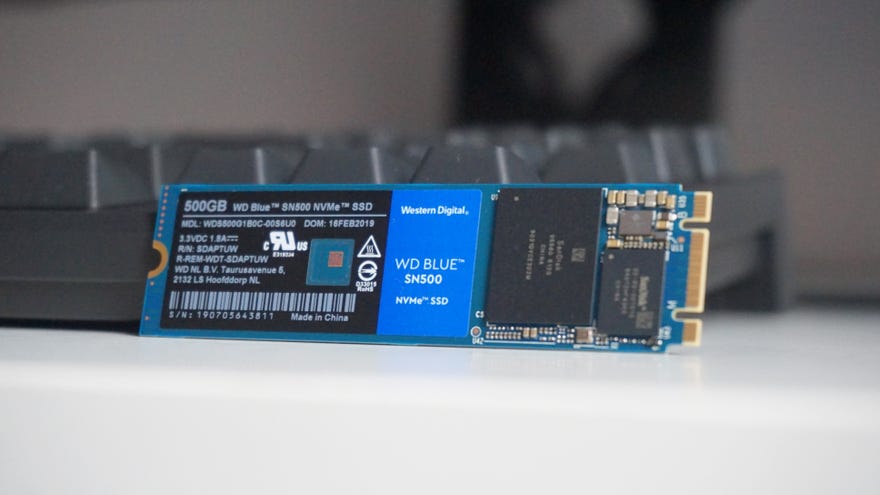Our best budget NVMe SSD is getting a new, faster 1TB model
Introducing the WD Blue SN550
Thanks to its low price and nippy read and write speeds, the WD Blue SN500 has been one of the best solid states to come out this year. The one thing it's missing, however, is an equally good value 1TB model. Thankfully, WD have heeded those cries for a budget-friendly 1TB SSD and are about to introduce their new Blue SN550 SSD, which not only adds that aforementioned 1TB size capacity to the mix, but also offers even faster read and write speeds.
Alas, there’s no word on exact pricing just yet, but provided WD manage to keep the SN550’s costs down to the same sort of level as their existing Blue SN500 stick (£40 / $46 for 250GB and £63 / $65 for 500GB), then it could be another budget champion for anyone looking to make the move from SATA to NVMe without emptying their bank account in the process.
Indeed, with WD claiming a sequential read speed of up to 2400MB/s for the SN550, that makes it 41% faster than the SN500's top read speed of 1700MB/s, which will be quite the jump in performance if WD manage to get the price down. I suspect it will end up being quite budget, though, as even 2400MB/s is still a long way off from the very best NVMe sequential read speeds out there, such as the 3740MB/s offered by WD's top of the line Black SN750, for example, and the 3500MB/s of Samsung's 970 Evo Plus.
(Update: I've just had word on UK pricing, which is set to be £50 for the 250GB model, £75 for the 500GB version and £125 for the 1TB SN550. That's a little more expensive than the SN500, but it's still a heck of a lot more affordable than the 970 Evo Plus (£65 / £95 / £180) and just under WD's Black SN750 (£58 / £86 / £170). I'll add in US pricing as soon as it's available)
Interestingly, WD make no mention of the SN550's sequential write speed in their initial announcement, but I would hope to see a similar kind of boost over the SN500's top speed of 1450MB/s. Even if its sequential write speed doesn't end up being that much faster than the outgoing SN500, though, it should still be quite a bit faster than what your standard SATA SSDs can manage, which usually top out at around 500-560MB/s sequential read and write.
Of course, sequential speeds are only half the story when it comes to an SSD's everyday performance, as your PC rarely reads or writes data in nice, neat sequential blocks. Instead, it usually chucks them about all over the shop, which is why random read and write tests are usually a much better indicator of the kind of speed you'll see day to day. Random speeds are often a lot slower than the sexy, 1000+ speeds quoted on the box, though, and there are plenty of NVMe SSDs whose random read speeds aren't actually that much faster than the best SATA SSDs out there. Their random write speeds are usually a lot quicker, but without a number to give us some idea of how the SN550 is going to perform in this department, I'll have to wait until I get one in for testing to see how it really stacks up against its SATA and NVMe rivals.
Still, provided WD manage to keep the SN550's price in check, this is definitely one to watch for potential NVMe buyers.

